The Stranger Manual
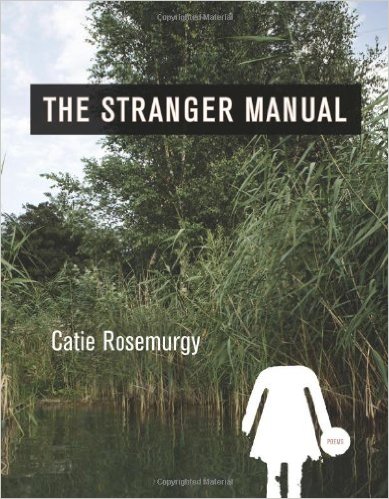
 by Catie Rosemurgy,
by Catie Rosemurgy,
Graywolf Press, 2010,
94 pages, paper, $15.00,
ISBN: 978-1-55597-547-0
Buy the Book
In The Stranger Manual, Catie Rosemurgy writes odd, strangely thrilling poems like bite – size morality tales that mock their own relevance with a slyly caustic grin. Her voice is as alive and electric as Saturday Morning Cartoons, back when they were still good and worth worshipping.
There is exuberance in these poems, and a kind of willful naïveté in the tone that renders ironic the cynicism in the content: “At the base of my wet brain — whatever, / of all brains, all allegedly intricate human brains — / a smallness lies tangled in the roots / of largeness, the one interesting secret is lost / inside the big idea. At least I, in my red socks, hope so.” Rosemurgy steps nimbly from the intimate to the ultimate in those dainty red socks, dancing giddy circles around serious issues. With equal parts wit and whimsy, Rosemurgy comments on the human condition, such as it is, and such as she sees it with all of its contradictions, customs, and confusion.
Rosemurgy tickles the essence of things with pointed description and cutting metaphor, shifting easily from cancer – serious to puppy – playful and back again as needed. “Miss Peach: The War Years” begins with this:
She’s been lobbed,
and like other grenades
can’t help but like
the deeply American ache
where the pin used to be.
She is a squat,
angry seed that blooms
into absence, into big flowers
of what was, a trick fruit
that creates its own mouth,
a wild eye that blinks
its own face away.
This “Miss Peach” is her only named character, yet she defies definition despite being the focus of many of the poems. This is because Miss Peach lives mostly in the titles, intentionally wordy bits of exposition that twist whatever content follows in the body. One title reads: “Miss Peach Imagines She Is an Aging British Rock Star and Considers Bipedalism While Responding to a Beautiful Woman Who Has Just Said ‘I Love You,’” and here is another: “The Monkey Whose Job It Used to Be to Sit on Miss Peach’s Shoulder Takes Up Olde Timey Music.” Any attempt at clear, linear story – telling made by the titles is gently sabotaged, and rightly so, by her playful resistance to what is expected.
Rosemurgy is fascinated with relationship expectations, social taboos, and dating etiquette, and she adds to the discussion in a way that seems fresh despite the high traffic this topic has received. Reading Rosemurgy is like talking to a girl at a party, realizing that she’s a bit on the nutty side, and not caring, because she is the fun kind of touched that wakes you up, slaps you around, tickles you stupid, and in the end, probably has the healthiest perspective around.
There is a playful sexuality bopping around within this book, an impish urge to increase the friction between sweetly disparate images and somehow use that energy to fuel the blowing of your mind.
— Todd Perry
The Lilac Thief
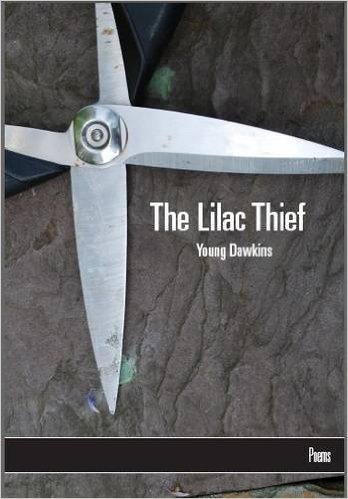
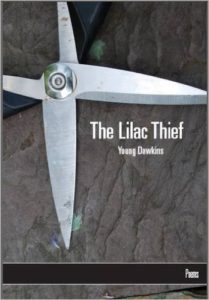 by Young Dawkins,
by Young Dawkins,
Sargent Press, 2009,
48 pages, paper, $10.00,
ISBN: 9780615322018
Buy the Book
Reading Young Dawkins’, The Lilac Thief, feels like the struggle between remembering and understanding. As if we are walking backwards, Dawkins’ poems are both a look back and a progression. We see the dark faces of past lovers, past lives that seem disjointed and disconnected, and yet are essential for the journey we call experience.
In “What I Know About Women So Far,” the forgotten romance of routine turns into a complicated mixture of violence and sustenance: “Our sex / is like shrapnel and oranges.” Dawkins continues to work with similarly pitted images, like “spectacular train wreck marriages,” to understand the “long and dark” bodies of women who invite the narrator to
come inside and witness
the collision and drift
of ancient continents,
watch the dinosaurs die,
and be warmed by the very first fire.
And always,
and always,
the inevitable rise of civilization,
the ambitious yearning of man.
But she is in the kitchen now,
Happy with her new oil
and olives and cheese.
And I believe it has always come to this,
here
in the lowering light.
By the end of this remembering, this musing on love and sex, comfort and necessity, we are still unable to tell the difference between love and lust. As the narrator enters into new relationships with new women — “dancing / in the early / ballroom of desire” — we know love and lust exist intertwined, as separate and essentially linked as all humans seem to be.
There are moments in these poems where Dawkins, a poet from New Hampshire who generally creates in the performance and beat genres, allows his poems to struggle in their own creation. These poems waver between the sonics of beat poetry and the lyric emotion of his landscape of ex – lovers; this conflict seems to mirror the narrator’s struggle to understand his own experiences. And for all the trouble that beat, performance, and slam poets get when they try to translate their work from the stage to the page, Dawkins has succeeded.
Reading along with these poems, I forget the sound bite – driven language that often dominates the way we speak to each other today. The reward Dawkins’ poems provide is a vacation from fractured, polarized interpersonal communication. A gift of prolonged engagement, these poems invite a deeper understanding of the more intimate and complicated “collision and drift” between us all.
— Mark Rice
I Was the Jukebox
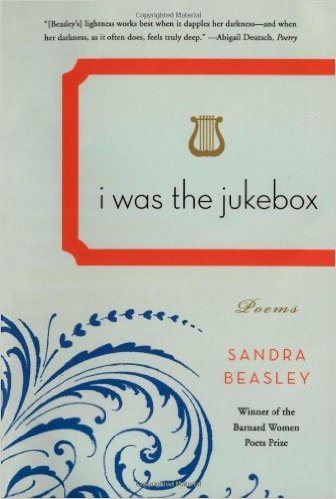
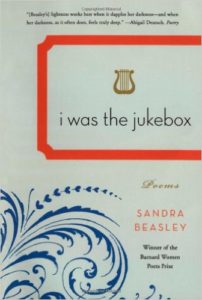 by Sandra Beasley,
by Sandra Beasley,
W.W. Norton & Company, 2010,
90 pages, hardcover, $24.95
ISBN: 978-0-393-07651-6
Buy the Book
In a poem from Sandra Beasley’s I Was the Jukebox, the poet offers an epigraph from conceptual artist John Baldessari: “As soon as you put two things together, you have a story.” Beyond merely name – dropping the visual arts, it seems that Beasley has accomplished in this book what so many of us have tried to do: She has found a way to make sense of the visual world, not by forcing a personal narrative upon it, but by allowing the mind to make its own connections, and this flexibility of thought and creativity has led to an astonishing and thrilling result.
The poems of I Was the Jukebox give voice to the mute and the inanimate — the platypus, the piano, the eggplant, the long-dead Greek hero on a first date with the narrator — but there are subtle shifts in the tone of these personae poems that keep them fresh as the pages turn. One such poem, “Cast of Thousands” speaks in the voice of an entire set of movie extras “My death is the clip they send to the Academy / later they will kill me in Spanish, then French.” Another utilizes the shape-shifting logic of dreams, allowing the narrator to speak as the eponymous jukebox. In this poem, “You Were You,” the narrator cum jukebox says to the beloved:
I dreamt we were in your favorite bar:
You were you. I was the jukebox.
I played Sam Cooke for you,
but you didn’t look over once.
I wanted to dance. I wanted a scotch.
I wanted you to take your hand off of her.
There is a real challenge in writing poems from the point – of – view of these objects, but on each page of this book, Beasley finds a way to present us with both the newfound perspective of the object alongside the deeply felt pathos or joy of the narrator.
In later passages of “You Were You,” the reader gets a sense of how marvelous it would be to become the jukebox: It glitters and shines and offers up the best of R&B, pop, and soul. And yet, we know that all the jukebox longs for is the partner across the room, seducing another woman.
What makes this collection work so well is not simply the new slant that Beasley gives to the world of experience. She also has a true feel for the sensual details, which makes the universes that these poems conjure as much of a joy to feel as they are to imagine. A particular favorite poem might be “I Don’t Fear Death,” in which Beasley pictures “field after field / of sorghum crisp to my touch.” Later, she describes the clouds, which are “yellow, smelling of / fireworks and salt.”
I can’t help but compare the Baldessari epigraph to Beasley’s first book, Theories of Falling, which was at times autobiographical, but still gave the sense that this poet would never be interested in simple narratives. Experience isn’t worth a thing if you can’t find a flame of desire in each of its moments, the book seemed to say. Here, in this second collection, Beasley takes brave new steps outside of her comfort zone, seeking new meanings, new juxtapositions, and new subject matter.
For some, the consistent disorientation of each newly voiced persona may lose some luster after awhile, but I say: Give it time. This is a smart book, and a well – crafted one. While the book may be challenging to read through in one sitting, these poems are worth many return trips.
— Thom Dawkins
Black Boat Black Water Black Sand
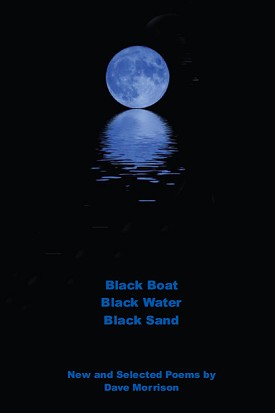
 by Dave Morrison,
by Dave Morrison,
Moon Pie Press, 2009,
74 pages, paperback, $10.00,
ISBN: 978 -1 – 61539 – 452 – 4
Buy the Book
Dave Morrison crafts tall poetry with an XL talent and the assessing gaze of an expert onlooker, poems with an all – over texture — part chamois and part steel wool. With an eye for detail and a bottom line that takes language for a ride, Morrison doesn’t keep it level and moving at one speed but guns it, puts it through loops and dives and steep climbs, reeling into witty, often very funny poems full of simplexity, kidding and not kidding at once — I am jealous of the dead for / their reduced workload — as he strives to make sense of life.
Every line feels cared about, really meant, subjected to crash – testing, even moments of heart – rending beauty. If there’s an overriding theme it is that of an Everyman filled with the aspiration for recognition and personal ripening; a drive toward self – acceptance and fulfillment, always wondering how to shake the feeling that you’re always one day late. These poems acknowledge the ever -present possibility of failure, conflicts never quite resolved, the high cost of breaking even, how a howl won’t heal the / scar, but it helps the / bleeding, lights a match, that even if we fail, we must keep trying to fail better.
Morrison’s poems reference a wide range of interest in and knowledge of science, ancient history, music, and pop culture. He’s one of those rare writers who appear to know a lot about a lot, whose work puts a contemporary spin on the classical ideal of poetry as both informational and highly entertaining: serious poetry that doesn’t crush us with high seriousness.
Though many of the poems are political, they’re never the God – awful preachy diatribes that John Keats loathed for their having a palpable design on us. Morrison doesn’t take an
I – know – better – than – you proselytizing tone with us. He never looks down from above.
Too many poets these days seem not to have read much poetry, are unfamiliar with the history of the form and content, and have not absorbed the lessons of the masters — and for that, there’s a tangible hollowness in their work. Morrison has done his homework: Look at this excerpt from his “Care to Join?” — a mordant, satiric take on crowd behavior in all its wonted irrationality worth chapters of sociological analysis.
As the mad group inevitably becomes large and wealthy and powerful and sooner / or later starts to rot from the / inside out, everyone in it
starts to lose their
humanity, starts to get paranoid
and brutal, starts to lose their ability to
recognize bad choices and
repulsive behavior, and starts to think
that they are better than anyone else, and that
anyone not in the group isn’t worth a
damn, and they become this huge slobbering
thing that just eats and shits and eats and shits
and eats, and sooner or later this group becomes like
a drunken sumo wrestler, so that it either topples itself
or is brought down by a smaller leaner more determined
foe, who then begins to eat and shit and eat and shit, and
we never learn anything
and it just goes on forever and makes you lose faith in
the human race, so no, thanks, I’d just as soon not join.
Remind you of anyone? Think Jonathan Swift, his vitriolic disgust for the Yahoos.
Lastly, I want to recommend this poet for the variety of his craft. Morrison is able to write lines that free – fall through history, clutching at twigs of the long – gone and the passing – by to render moments of deep resonance and beauty. There’s something for everyone, every taste: a splendid sonnet, “Unlikely Sonnet;” “Camaro,” a poem in perfect tetrameter; poems that show a fine ear for unobtrusive rhyme; and the wild and surprising wordplay of “Drums Along the Interstate.”
Definitely one of the best new books of poetry, a must read.
— Ted Bookey


